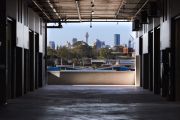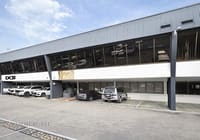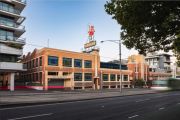
Mall values to fall before growth in 2025: Region Group boss
The chief executive of Australia’s largest convenience shopping centre landlord says mall values have a “little further to fall” but robust rental income growth will prevent a steeper correction ahead of a return to earnings growth in the 2025 financial year.
Delivering interim results in line with consensus, Region Group boss Anthony Mellowes also took aim at other mall landlords that had not adjusted their property values in line with the higher interest rate environment. The group reported a 2 per cent decline in the value of a $4.3 billion portfolio of suburban malls anchored by Coles and Woolworths supermarkets.

The latest dip in values followed Region Group writing down its assets by $264 million over the 2023 financial year, a fall of 4.4 per cent.
“We’re an internally managed fund, so we don’t need to push valuations to drive fees,” Mr Mellowes told analysts after Region re-affirmed its earnings and distribution guidance for the full year.
“We’ve put in what are realistic capitalisation rates. We’ve moved earlier than others who will be catching up to us over next 6-12 months.”
The first major real estate investment trust to report its half-year results, Region set the stage for anticipated asset writedowns across the sector, an increase in capitalisation rates, but also the prospect of a rosier outlook for REITS on the back of lower inflation and the potential for interest rate cuts later in the year.
Region, which owns 93 smaller suburban malls and is the biggest landlord of Woolworths and second-biggest of Coles, has lifted capitalisation rates – akin to investment yield – 61 basis points since the asset revaluation cycle kicked after the Reserve Bank started lifting interest rates in May 2022.
Returning to earnings growth
The latest six-monthly movement was an increase of 18 basis points in Region’s weighted average cap rate to 6.04 per cent.
Higher cap rates imply lower property valuations, but a steeper fall in values was offset by income growth, Mr Mellowes said.
The smaller asset writedown over the half-year drove a 63 per cent improvement in the bottom line as Region reported a statutory interim loss of $35 million.
Funds from operations – the key underlying performance metric for real estate investment trusts – fell 6.6 per cent to $87.9 million as higher interest expenses offset a 2.1 per cent rise in net operating income. This is expected to improve in the second half of the year (to average 3 per cent for the full year) as interest and property expenses start to moderate.
Asked by The Australian Financial Review when Region Group would return to earnings growth, Mr Mellowes said it would provide guidance on fiscal 2025 in August, but that analysts’ consensus was for “slight growth” in that year.
Retail landlords are better place than other sectors such as office, which is under more pressure
“We see potential for Region to recover its earnings outlook and return to growth in FY25. We see a slowdown in inflation, and stabilised and reducing interest rate costs as catalysts for a potential earnings recovery for Region,” said Citi Research analyst Howard Penny.
A $200 million asset recycling program, which has delivered $77 million of sales, would help pay down debt and reduce gearing. Region also restructured its debt book at zero cost over the half year so that 98 per cent of its current drawn debt is hedged, protecting the group against market interest rate volatility.
After the Reserve Bank left interest rates on hold on Tuesday, Mr Mellowes said stabilisation of rates would help keep capitalisation rates at a “natural level” and would be positive for REITs “across the board”.
However, he did not anticipate the RBA cutting rates until inflation was well within its target band. “There’s still a fair way to go, but we’re heading in the right direction,” Mr Mellowes said.
“There will still be valuation movement across the entire property sector. But retail landlords are better place than other sectors such as office, which is under more pressure.”
Boost from e-commerce
Supermarkets, which anchor Region’s malls and generate turnover rent, reported annualised sales growth of 4.2 per cent over the six months to December, up from 3.4 per cent over the prior corresponding period.
The group also benefited from the growth of omnichannel retailing, with 96 per cent of its stores including online sales in turnover rent calculations. In turn, sales growth was 0.5 per cent higher in centres where an e-commerce facility like click-and-collect had been installed.
Region’s non-discretionary tenants, which account for more than half of its rental income, generated sales growth of 4.6 per cent.
Mr Mellowes said the latest ABS retail trade figures for December (which showed a month-on-month fall of 2.7 per cent) showed sectors like food retailing, where Region has a heavier tenant weighting, performed better.
“Food retailing trade has stayed relatively normal. With other categories starting to turn negative,” he said.
He noted that sales at furniture retail Nick Scali – a discretionary retailer – fell 20 per cent in interim results also published on Tuesday.
Highlighting the relatively strong leasing conditions in non-discretionary retailing, Region completed 207 specialty leasing deals over the period, up from 195 in the prior corresponding period
It also booked a 2.6 per cent rental uplift on prior leases – known as a positive leasing spread.
Region securities ended Tuesday flat at $2.24.











